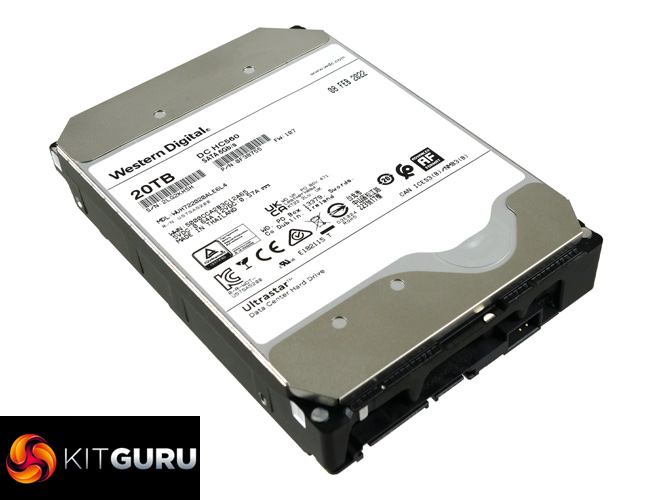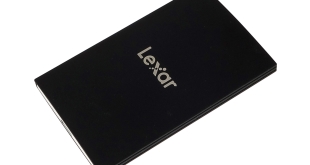We've all heard, for a long, long time about the decline of the hard disk drive and how the rattly old spinning disks are no longer relevant now that SSD's seemingly rule the roost. Well, that may be true in the consumer market but in the enterprise segment, the hard drive is alive and well, and indeed thriving. IDC projects that HDDs will represent 82% of capacity sold to the enterprise market in 2025.
WD's latest addition to the Ultrastar family of data centre drives is the DC HC560 which comes with a huge 20TB of capacity, 512MB of cache and a 7,200rpm spindle speed. The drive has an official performance rating of up to 269MB/s.
Along with the 18TB Ultrastar DC HC550, the DC HC560 is the first WD drive to use a nine disk platform. The areal density of each disk in the DC HC560 is 1,160 Gbits/in² while the DC H550 has a density of 1,022 Gbits/in². The Ultrastar DC HC560 uses some of WD's leading-edge HDD technologies; OptiNAND, ePMR, TSA (Triple Stage Actuator) and HelioSeal.
OptiNAND technology is a flash-enhanced drive technology developed by WD that integrates an iNAND UFS embedded flash drive (EFD), using 3D NAND, that sits on the hard drive PCB. Unlike the hybrid drives of the past, user data isn't stored in the NAND (except in the case of power loss), instead the NAND is used by the SoC and the drives DRAM to store the self-generated drive metadata instead of holding it on the disks themselves, freeing up more usable space.
Another clever trick of OptiNAND is that it saves data to non-volatile NAND memory in case of sudden power loss. If power is lost during the write process the SoC uses the rotational power of the still spinning disks to power up internal capacitors until any cached data transfers to the non-volatile NAND.
In the never-ending quest to get more capacity per platter in a hard drive, areal densities are increasing which in turn leads to tracks getting ever narrower. The problem with narrow tracks is the threat of magnetic inter-track interference (ITI) disrupting the writer part of the drive head. To combat this, in the DC HC560, WD is using triple-stage actuator (TSA) technology. TSA uses three pivot points in the actuator arm to more accurately position the head over the data track.
As with TSA, Energy-Assisted Perpendicular Magnetic Recording (ePMR) is another technology developed to overcome the problems associated with high areal density disks particularly “jitters”. Jitters occur when the write current at the recording head is flipped from one direction to another. ePMR applies a constant electrical current to the main pole of the write head throughout the write process, producing a more consistent, preferred signal path that helps to reduce jitter. Reducing jitters allows for the reduction of space between bits written which in turn allows for greater areal densities and larger capacities.
WD quote a sustained transfer rate of 269MB/s for the 20TB DC HC560. When tested with the ATTO benchmark we could confirm that figure with test results of 260MB/s and 261MB/s for Sequential read and writes respectively. The drive also performed very well in our workload scenarios, producing the best performance figures we've seen to date for an HDD in the File Server, Web Server and Workstation tests.
We found the WD Ultrastar DC HC560 on sale for £369.98 (temporarily reduced from £399.98) from Scan HERE.
Discuss on our Facebook page HERE.
Pros
- Overall performance.
- Drive technologies.
- 5-year warranty.
Cons
- Not cheap.
KitGuru says: WD's Ultrastar DC HC650 introduces some HDD technologies that point the way forward in terms of dealing with the problems posed by using platters with greater and greater areal densities, enabling even larger capacity drives in the future.
Be sure to check out our sponsors store EKWB here
 KitGuru KitGuru.net – Tech News | Hardware News | Hardware Reviews | IOS | Mobile | Gaming | Graphics Cards
KitGuru KitGuru.net – Tech News | Hardware News | Hardware Reviews | IOS | Mobile | Gaming | Graphics Cards




